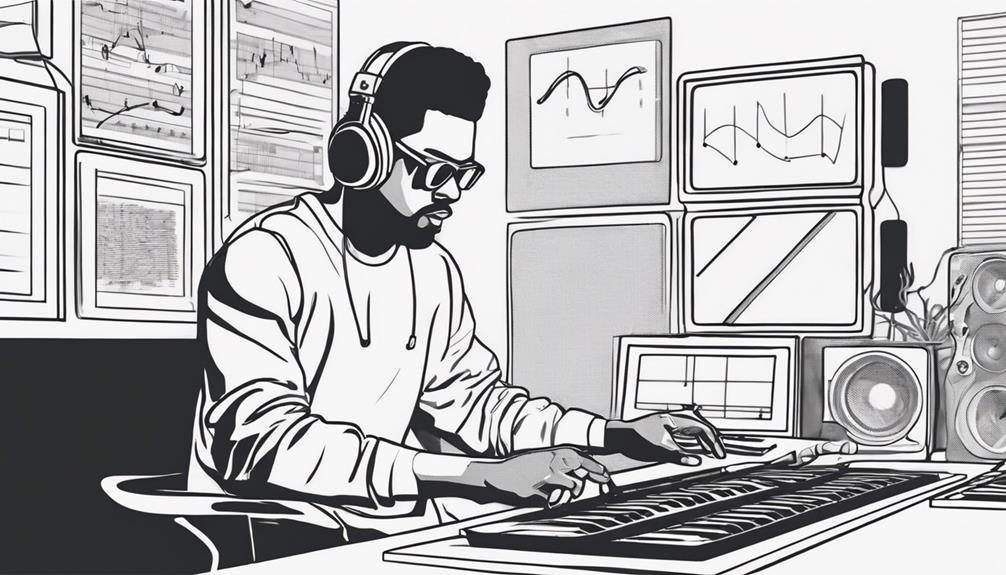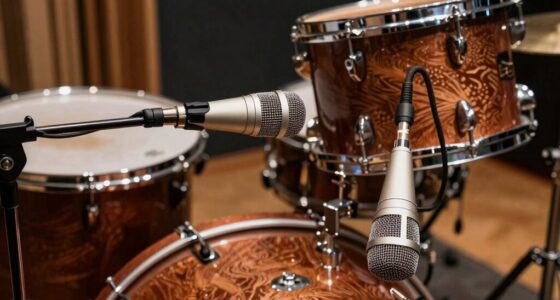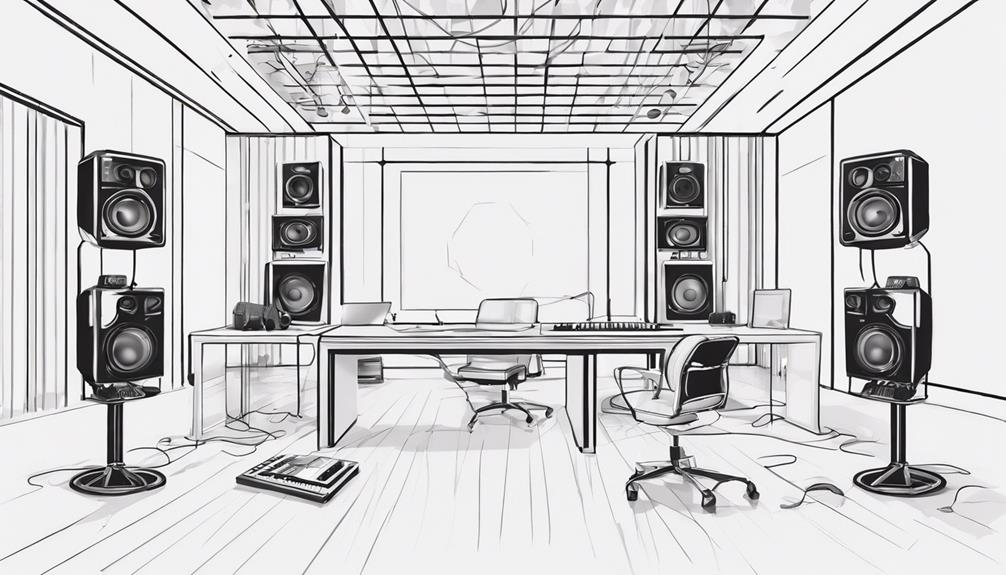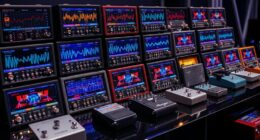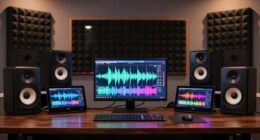To enhance your music production and improve sound quality, focus on mastering technical DAW skills and upgrading your gear. Immerse yourself in online tutorials for insights and explore advanced features. Take regular breaks to prevent ear fatigue and complete tracks instead of pursuing perfection. Plan sessions meticulously, set clear goals, and be open to creativity. Keep things simple for quality results and embrace a continuous improvement mindset. Explore new techniques and tools through online resources. Master the basics and then enhance your musical prowess step by step for a well-rounded approach to music production.
Key Takeaways
- Experiment with sound design techniques for unique textures and tones.
- Utilize high-quality samples and Kontakt libraries for professional sound quality.
- Focus on simplicity in arrangements for clarity and impact.
- Embrace a growth mindset to keep improving skills and techniques.
- Incorporate unconventional production elements like field recordings for creativity.
Mastering Technical Skills in DAWs
To excel in music production, master the technical skills of your Digital Audio Workstation (DAW) through dedicated practice and exploration.
When it comes to mastering music, understanding sound design, mixing, and mastering is essential. Start by familiarizing yourself with the various tools and functions of your DAW. Learn how to manipulate audio tracks, apply effects, and create dynamic mixes.
Explore online tutorials and resources tailored to your specific DAW to deepen your knowledge. Investigate advanced features to enhance your music production skills. Experiment with different plugins and effects to add depth and creativity to your tracks.
Customizing shortcuts and settings within your DAW can greatly improve your workflow efficiency.
Optimize Gear for Maximum Potential
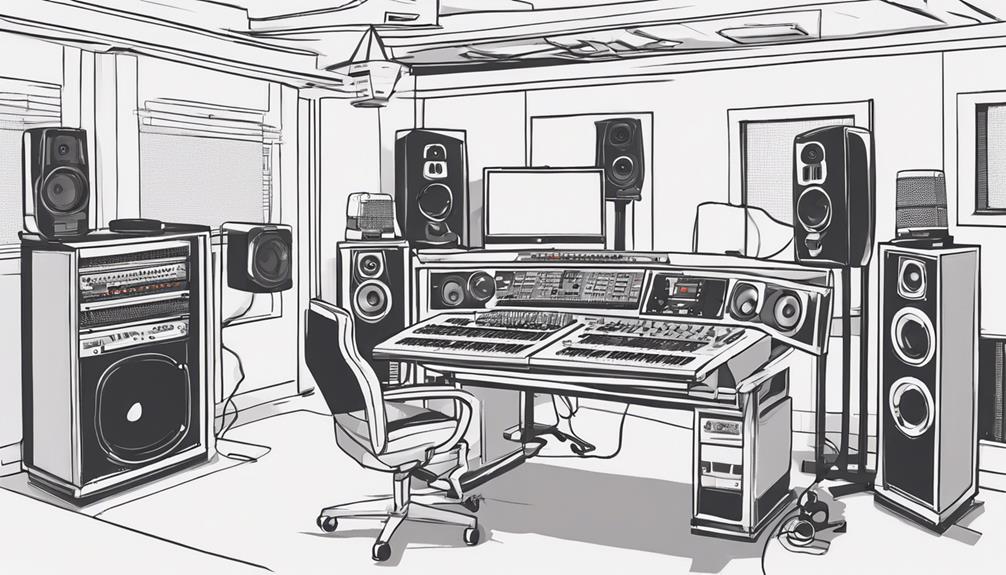
Mastering technical skills in DAWs lays a strong foundation for optimizing your gear to its maximum potential in music production. To achieve the best sound quality, invest in high-quality gear such as studio monitors, headphones, and audio interfaces. Properly calibrating and maintaining your gear ensures consistent performance and accurate sound reproduction. Additionally, incorporating room acoustics treatment and adjusting speaker placement can significantly enhance your listening experience. Upgrading to professional-grade microphones, MIDI controllers, and plugins can also elevate the quality of your productions. Experimenting with different gear combinations allows you to explore unique sonic possibilities and expand your creative palette.
| Gear Optimization Techniques | Benefits |
|---|---|
| Invest in high-quality gear | Enhances sound quality |
| Proper calibration and maintenance | Ensures consistent performance |
| Room acoustics treatment | Improves listening conditions |
| Upgrade to professional-grade equipment | Refines production experience |
| Experiment with gear combinations | Expands creative possibilities |
Preventing Ear Fatigue and Breaks
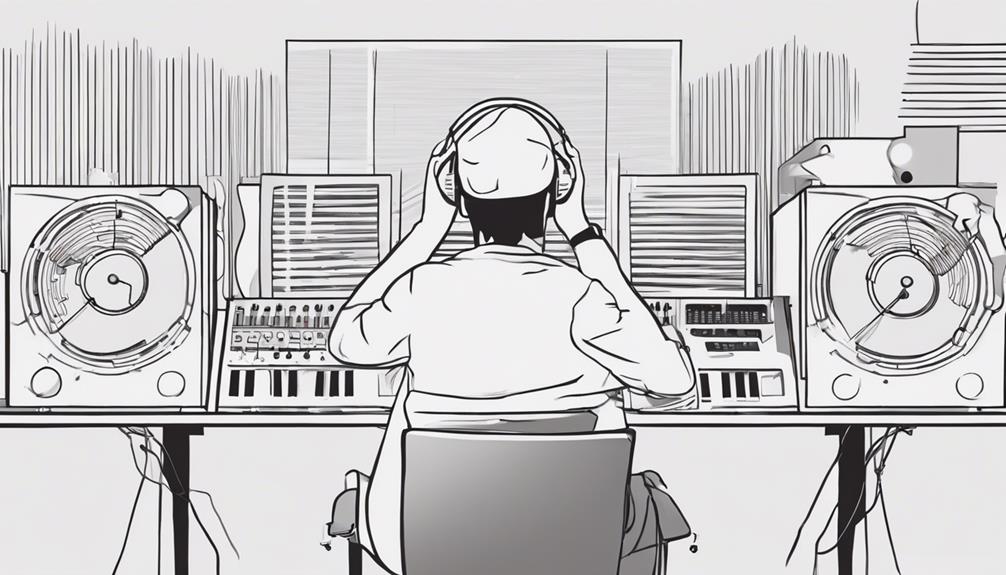
Taking breaks every 20-30 minutes can effectively prevent ear fatigue and help maintain your critical listening abilities.
Ear fatigue, if not managed, can result in poor decision-making during mixing and mastering, ultimately impacting the quality of your music.
To avoid this, listening at moderate volumes and using reference tracks are key strategies. Reference tracks provide a point of comparison and can guide you in achieving the desired sound without straining your ears.
Incorporating regular breaks into your production routine allows your ears to rest and reset, enhancing your ability to make accurate mixing decisions.
By implementing a schedule that includes designated break times, you can strike a balance between productivity and preventing ear fatigue.
Prioritize Finishing Tracks Over Perfection
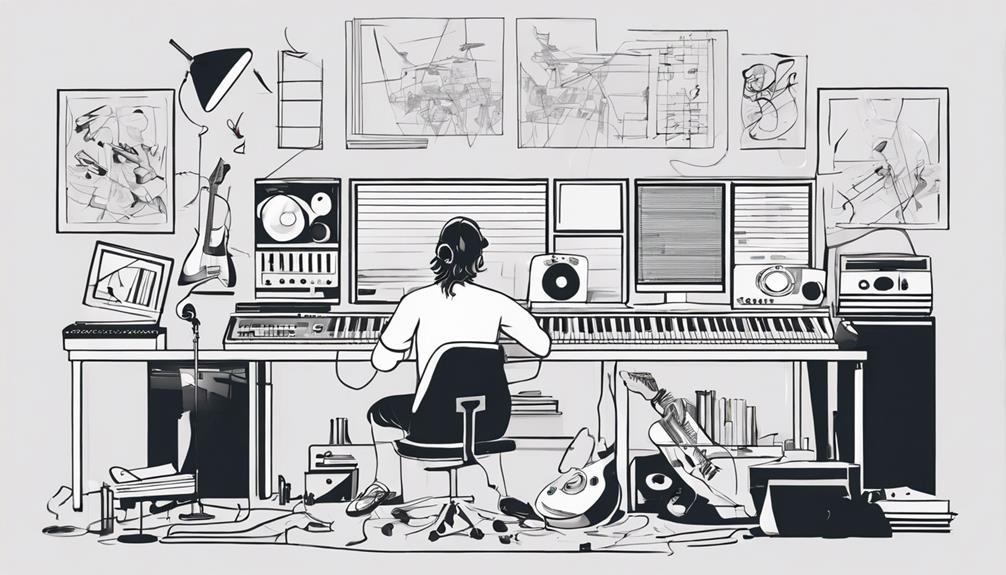
When producing music, remember to prioritize finishing tracks over perfection.
Embrace imperfections as they can add character and spontaneity to your music.
Capture the energy of the moment and keep progressing forward in your music production journey.
Embrace Imperfections
Embracing imperfections in music production can enhance your creativity and lead to more authentic and emotionally resonant tracks. By allowing imperfections to exist within your work, you open the door to a world of creative freedom where unique expressions can flourish. Prioritizing finishing tracks over perfection not only helps in developing a consistent workflow but also aids in completing projects in a timely manner. This approach can result in more authentic music that resonates deeply with listeners, as it captures raw emotions and vulnerabilities.
Here is a table highlighting the benefits of embracing imperfections in music production:
| Benefits | Description |
|---|---|
| Creative Freedom | Allows for experimentation and innovation in music creation. |
| Authentic Music | Leads to the production of music that feels genuine and heartfelt. |
| Progress | Fosters continuous improvement and growth in your musical journey. |
Embracing imperfections can lead to unexpected and innovative musical outcomes that may not have been possible in a quest for perfection.
Capture Energy Spontaneously
To maintain the freshness and spontaneity of your music, prioritize completing tracks over pursuing perfection. In the music production process, capturing energy spontaneously is key to infusing your tracks with raw emotion and authenticity.
Here are some tips to help you embrace this approach:
- Trust Your Instincts: Allow your intuition to guide you in making creative decisions without overthinking.
- Embrace Imperfections: Quirks in your music can add character and uniqueness to your sound.
- Avoid Over-Editing: Resist the urge to perfect every detail, as it may strip away the raw energy of the track.
- Stay True to the Initial Inspiration: Focus on capturing the initial spark that ignited the track to preserve its spontaneity.
- Maintain Creative Momentum: Prioritize finishing tracks to keep the creative flow going and prevent stagnation in your music production process.
Structured Session Planning
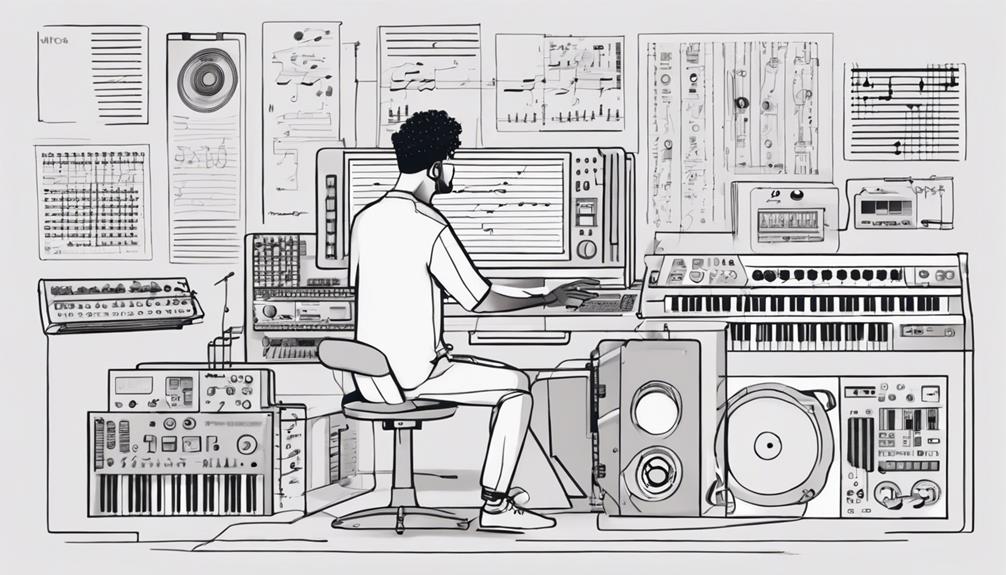
Enhance your music production workflow by implementing structured session planning, ensuring efficient use of time and resources.
When planning your music production sessions, it's vital to set specific goals and objectives for each session. Break down your tasks into smaller, manageable chunks, focusing on key elements like sound design and arrangement. Allocate dedicated time for each aspect of production, including mixing and mastering, to maintain a balanced workflow.
Create a structured timeline for your sessions to maximize productivity. By allocating time blocks for different tasks, you can stay organized and on track.
Regularly review and adjust your session plans to optimize your workflow continuously. This iterative approach will help you identify areas for improvement and enhance your overall efficiency in music production.
Embrace Creativity and Experimentation
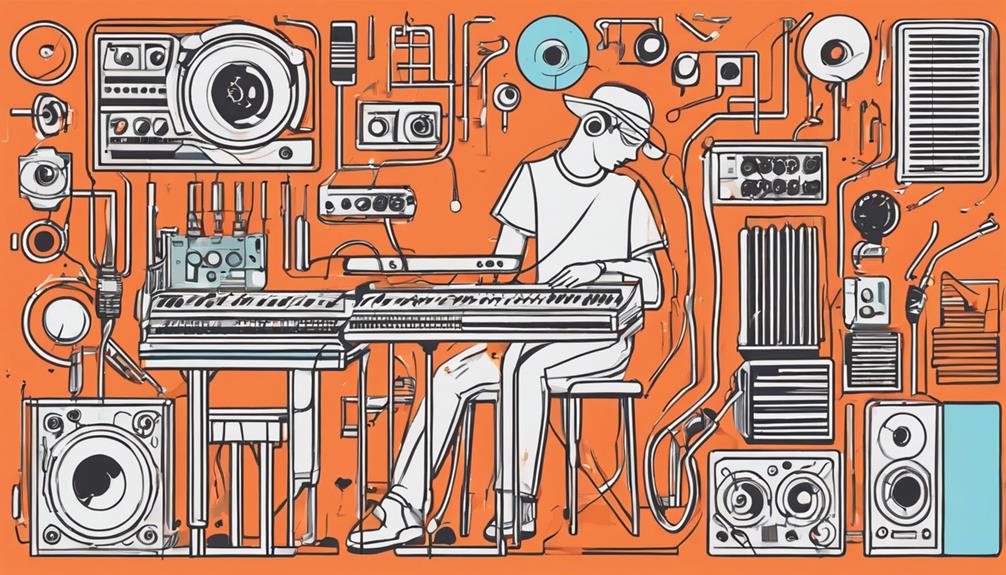
Try experimenting with different sound design techniques, like synthesis and sampling, to craft fresh and distinctive sounds for your music.
Embrace creativity by exploring new genres, styles, and approaches to infuse your tracks with innovation and excitement.
Consider incorporating unconventional elements, such as field recordings or found sounds, to add a unique and personal touch to your productions.
Try New Sounds
Explore different instruments, effects, and samples to infuse your music production with unique sounds and textures. Experimenting with new sounds can take your tracks to a whole new level.
Here are some ways to try new sounds:
- Incorporate exotic instruments like the sitar or kalimba for a fresh sound.
- Experiment with vocal samples and manipulate them using plugins for a unique twist.
- Blend organic sounds, like nature recordings, with electronic elements to create a hybrid sound palette.
- Try out unconventional effects such as granular synthesis or ring modulation to add depth and complexity to your tracks.
- Sample everyday sounds and use them creatively in your music production to surprise and captivate your listeners.
Mix Unconventional Elements
To infuse your music production with a fresh and innovative touch, consider mixing unconventional elements that add texture and depth to your tracks. By incorporating unexpected sounds, unique instruments, and creative production techniques, you can elevate your music to new heights and captivate your audience in unique ways. Experimenting with unconventional elements like field recordings, found sounds, or lesser-known instruments allows you to create a signature style that sets your productions apart from the rest. Embrace the opportunity to blend different genres and styles, pushing the boundaries of traditional production to showcase your versatility and creativity.
| Unconventional Elements | Unexpected Sounds | Unique Instruments | Creative Production |
|---|---|---|---|
| Field Recordings | Surprising Samples | Exotic Percussion | Genre Fusion |
| Found Sounds | Unusual Textures | Rare Synthesizers | Experimental Effects |
| Uncommon Instruments | Quirky Melodies | Ethnic Flutes | Innovative Arrangements |
Focus on Quality and Simplicity
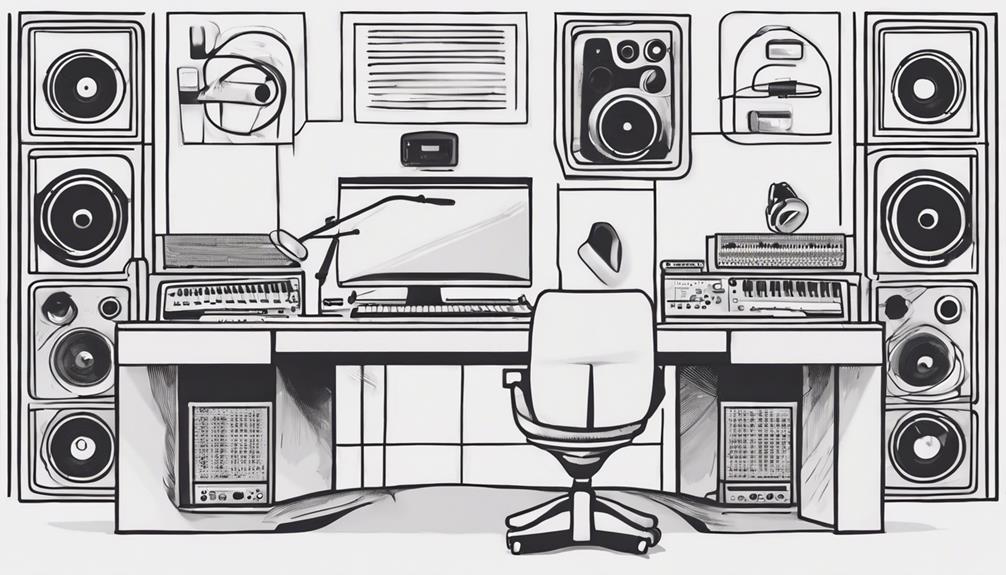
Prioritize quality in your music production by focusing on simplicity to achieve a polished and professional sound. When you simplify your approach and concentrate on the essential elements, you allow your music to shine through in a clean and impactful way.
Here are some tips to help you focus on quality and simplicity in your production process:
- Streamline your arrangements to highlight the core elements of your track.
- Trust your instincts and avoid overcomplicating things that don't serve the song.
- Embrace simplicity to create a more cohesive and professional sound.
- Keep your production process clean and organized to maintain quality throughout.
- Remember, quality often arises from simplicity, so don't be afraid to simplify and refine your music.
Continuous Improvement Mindset
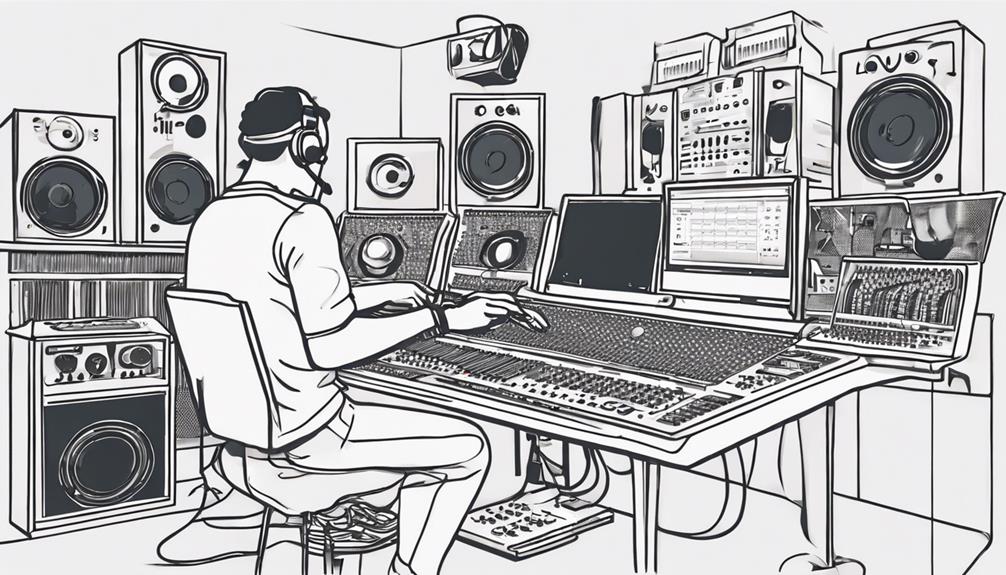
Embrace a growth mindset to continuously improve your music production skills. Keeping up with industry trends and techniques is essential for enhancing your knowledge and staying innovative in music production.
Seek feedback from peers and mentors to pinpoint areas for improvement and gather valuable insights. By experimenting with new tools, plugins, and genres, you can broaden your skill set and discover unique creative approaches.
Dedicate time to regular practice and learning to progress consistently in your music production journey. Remember that growth in this field is a continuous process, and maintaining a proactive attitude towards learning and evolving is vital.
Stay open to new ideas, embrace challenges as opportunities for growth, and remain adaptable to changes in the industry landscape. With a growth mindset and a commitment to honing your craft, you can elevate your music production skills to new heights.
Seek Knowledge and Online Resources
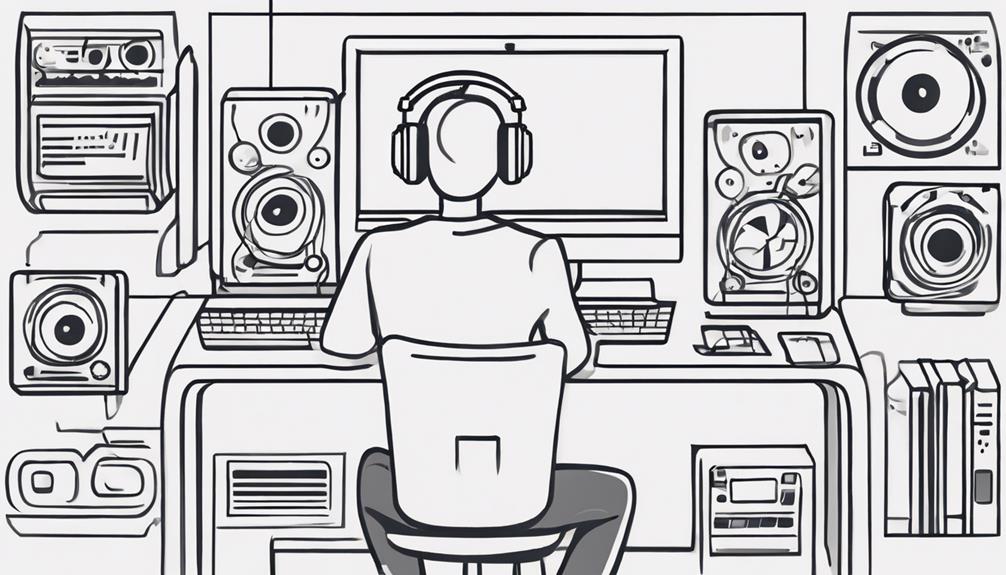
Maintain a forward-thinking approach by tapping into a wealth of knowledge and online resources to elevate your music production skills. Enhancing your sound quality and mastering techniques is vital in the competitive music industry.
Here are some practical steps you can take:
- Explore online music production tutorials from reputable sources like Native Instruments and iZotope blogs.
- Join online communities and forums to connect with other producers and receive valuable feedback.
- Utilize resources like iZotope's Ozone and Master Assistant for mastering your tracks effectively.
- Find high-quality drum samples and loops online to enhance your music production.
- Experiment with different Kontakt libraries to access a wide range of sounds for your music productions.
Frequently Asked Questions
How Do I Make My Music Sound Better?
To make your music sound better, utilize EQ to carve out space, experiment with reverb for depth, use compression for control, incorporate automation for movement, and master sound design for uniqueness. These techniques enhance your sound quality. Additionally, layering multiple elements effectively and panning instruments across the stereo field can create a fuller, more dynamic mix. By combining these strategies with a deep understanding of compressing music production techniques, you can achieve a professional, polished sound. Remember, balancing creativity with technical precision is key to making your music truly stand out.
How Can I Get Better at Audio Production?
To get better at audio production, you should practice consistently, experiment with new techniques, seek feedback, and utilize resources like tutorials. Master your DAW, learn sound design, and understand music theory for improved results.
How Can I Make My Music Sound More Professional?
To make your music sound more professional, focus on balancing frequencies, dynamics, and stereo imaging. Utilize mastering tools like Ozone and Master Assistant by iZotope. Implement audio processing techniques such as compression, EQ, and reverb for a clean mix.
How to Improve Electronic Music Production?
To enhance your electronic music production, immerse yourself in mastering sound design, mixing, and MIDI controller usage. Explore synthesis, sampling, and arranging for unique sounds. Utilize plugins like synthesizers and effects processors to elevate your music.
Conclusion
To wrap up, ensure you diversify your approach to music production. Keep refining your skills, optimizing your gear, and taking breaks to prevent burnout.
Remember, Rome wasn't built in a day, so keep aiming for improvement and embracing creativity. With dedication and a growth mindset, you'll be on the right track to achieving your musical goals.
Keep pushing boundaries and thinking outside the box – the sky's the limit!

